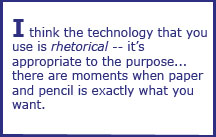KY: I know this will probably sound either like a dodge or so vague that it's not useful, but again I think technology is rhetorical. It's appropriate to the purpose, and we see this in real world practice. Quite frankly, if I'm sitting on a plane, and the plane is taking off, the technology that I'm going to use, given the equipment that I have, is paper and pencil. You're not allowed to have a laptop on, so you're not going there. I would really like a PDA with print recognition software, and I'm actually thinking I may buy one of those, and maybe you can run those during take-off, I'm not certain. My point is simply that there are moments when paper and pencil is exactly what you want.
To use another example, the National Assessment of Adult Literacy contains studies in which people keep track of how much they write, the medium they use, the purpose, the audience and so forth. One of the things that is pretty clear is that there's a real pattern where people want to use print for really special occasions and for people who are dear to them. Print has a real role to play in mediating social relationships. Digital technology has a role to play too. The question is “What do you need to learn for what purpose?”
| The other thing is, I'm not a big fan of learning a technology that doesn't have either some direct potential for transfer into another site or doesn't have some potential for generalizability. In other words, I want to learn technology that teaches me something larger so I can use it in a metacognitive way. I think there's some balance here. Ease of use is not unimportant, but it is also that you need what you need. I tend to count on the rhetorical situation to assist me with figuring that out. |
|
The question about how much technology you're teaching in a composition class is a much easier question to answer than how much technology you are going to teach in a literature class because a literature class, in most cases, is still about consumption or in Gunther Kress's terms, about “critique.” It's not about creation; it's not about design. Now whether it should be is a different question. To the extent that literature classes are about creation and design, then teaching digital technology in those classes actually becomes something that you do. Again, I think it depends on the rhetorical situation of the class that you're teaching and its outcomes. Even in a computer science class, you don't actually learn software only to learn the software; it's always for a larger purpose—to solve a problem, to answer a question. It seems to me that is a commonsensical approach, in the best sense of common sense.

